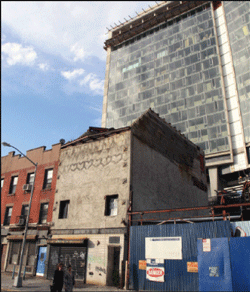By Jefferson Siegel
As a musician, Novac Noury looked forward to “bringing down the house” with each performance.
As the owner of a three-story building next to the nearly completed Standard Hotel in the Meatpacking District, Noury said the hotel construction had left his property shaking all over.
After two years of construction, Andre Balazs’s 19-story hotel, towering over Noury’s backyard and straddling the High Line, is nearing completion. As work finishes, Noury fears his building may be finished, as well. Large cracks have grown on his walls as a result, he said, of heavy equipment used by the hotel’s builders.
On a misty, chilly afternoon last Friday, Noury held a musical protest in front of the hotel’s construction entrance next to his building. He was joined by a half-dozen members of the Hudson Guild’s Senior Citizens singers, who had traveled from their nearby Ninth Ave. Community Center after a lunchtime performance.
“We’re here today to demonstrate that deep-pocket developers that come into this historic area are ruining the relics,” Noury proclaimed as the singers held up signs reading, “I Will Survive,” recalling the 1978 Gloria Gaynor disco hit, as well as Noury’s career as a musician and performer in such noted disco-era venues as Studio 54 and Odyssey 2001.
Back then, Noury was known on the nightlife scene as the Phantom of the Organ for his patented arrow keyboard — a handheld instrument he would play while boogieing in the clubs. Nowadays, he leads weekly senior singalongs at the Hudson Guild.
“Last week they sculpted this wall without my permission,” Noury said as he pointed to the east wall of his building, facing the construction site, which he claimed was leaning an inch out of plumb. Noury added that workers recently carved a rat hole on the same wall, giving rats infesting the construction site easy access to his building.
There are “crack monitors” mounted on the building’s roof that measure the growth of fissures and the separation between floors and walls. Noury said that last year, the Department of Building’s B.E.S.T. (Building Enforcement Safety Team) Squad inspected and issued a notice of failure on the part of construction workers to secure adjacent buildings, including his.
Reaching into a thick sheaf of papers, Noury produced a “crack monitor” report prepared by Lang Engineering and addressed to Pavarini McGovern, the construction management company that is working on the Standard Hotel. It read in part, “The wall in question…appeared not to have proper footings below.”
Noury disputed this conclusion, invoking the history of the block.
“When Boss Tweed dredged the Hudson and created landfill here,” he said as his hand swept past adjoining buildings, “the footings were placed here to dam off the Hudson. A gigantic, humongous footing that can hold up a 20-story building is holding up my three-story building,” he claimed.
Two years ago, a construction manager for the hotel told The Villager that support piles would be drilled, not pounded, into the ground, in order to avoid damage to the older neighboring buildings.
As Noury inveighed against the damage to his property, a Buildings Department inspector arrived in response to a complaint Noury had filed several days earler. Noury brought the inspector up to the second-floor patio, where one wall displayed a sizeable crack as well as the word, “Cracked” painted by Noury in large letters.
Noury pointed to crack monitors mounted on several walls that showed noticeable gaps. He also scooped up handfuls of debris he claimed fell from the hotel during construction.
The inspector also surveyed the roof of the adjacent building, 53 Little West 12th St., a property owned by the estate of William Gottlieb. On that building’s roof Noury showed the inspector a crack large enough to put his hand in.
As the inspector took notes and photos, Noury requested an emergency stop-work order. The inspector said he would have to discuss it with his supervisor.
Late Friday afternoon, Buildings listed Noury’s complaint as “Resolved,” noting, “No violation warranted for complaint at time of inspection.” Despite the inspector having taken photos of the crack monitors, the disposition curiously read; “no monitors on building,” as well as, “party wall not leaning.” Buildings did not respond to a request for comment by press time. (A party wall is a wall currently or formerly shared by two buildings.)
As he stood on the sidewalk across from several meat-processing companies, Noury talked passionately about the history of the building he leased in the early 1980s and bought outright in 1984. William Waldorf Astor, the father of John Jacob Astor, built the three-story building, which stands just a few hundred feet from the Hudson River. Noury claimed there was an underground passageway built between the building and Pier 54, when the pier served as an international customs pier.
Noury has development plans, too. He outlined his own scheme to convert the building into an inn, with rooftop chairs facing the High Line and a tunnel converted into a museum honoring Astor’s legacy. Noury said he’s “inches away” from sealing a deal with a development partner to realize his dream.
“The senior citizens will be singing ‘I Will Survive’ that developers won’t be throwing us out of our buildings, destroying our buildings in New York City and leaving us out in the street,” Noury said, promising that there will be more history made on his block as he strives to protect his building.






























